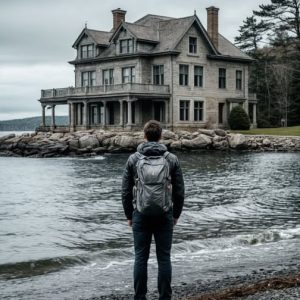Elliott Row was just finishing breakfast when his phone rang. He glanced at the screen. Unknown number.
“Hello?” he said, still watching the omelet sizzle in the pan.
“Mr. Row,” said a voice, calm and official, “this is your family’s notary. You need to come in tomorrow. There’s a matter of inheritance.”
Elliott frowned. “Inheritance? From who?” But the call ended as quickly as it began.
By morning, he was more curious than confused. As he stepped into the quiet office, the notary was already waiting.
“This concerns a man named Walter Jonas,” the notary explained, placing a large brass key, a faded map, and a slip of paper on the desk. “He left you a house.”
Elliott blinked. “I don’t have an uncle named Walter.”
“According to these documents, he was your relative. The property is located in the middle of Lake Konamah, in central Connecticut.”
That stopped Elliott. He’d never even heard of the place.
Still, an hour later, his backpack was packed. The lake was only forty minutes away. The closer he got, the more intrigued he became.
When the road ended, he stood before a wide, still lake. Right at its center sat a large house, perched on the water like an old memory. Nearby, a group of locals sat sipping coffee on a café porch.
“Excuse me,” Elliott asked, “do you know who lived in that house?”
An older man lowered his cup. “We don’t go there. Nobody does. But the house… it’s been there for decades.”
At the dock was a small sign: *June’s Boats*. The woman inside gave him a measured look when he handed her the key.
“You sure you want to go out there?” she asked.
Elliott nodded.
“I’ll take you,” she said, “but I won’t wait overnight.”
The boat ride was quiet. As the house loomed closer, it struck Elliott how untouched it looked — as if it had been waiting.
He stepped onto the dock. “Good luck,” June said, already turning her boat back toward the fog.
Inside, the air smelled of wood and time. Everything was still. Curtains were drawn, furniture covered but clean. One portrait caught his eye — a man by the lake, the house behind him. The label read: *Walter Jonas, 1964*.
In the study, rows of notebooks lay in stacks, some dated only months ago. A telescope faced the windows. In the bedroom were dozens of clocks, all stopped. On the dresser — a locket, inside it, a baby’s photo. The name “Row” was etched beneath it.
Elliott’s heart pounded.
In the attic, old newspapers were stored in boxes. One clipping stood out — a 1997 article: *“Boy Disappears From Middletown. Found Days Later, Safe.”* It was him.
He sat on the bed that night unable to sleep. So many questions.
And then, just before midnight, he heard something. A distant metallic sound. A door?
Flashlight in hand, he explored the house. Behind a tapestry, he discovered a hidden iron door. It creaked open to reveal a stone staircase descending beneath the house.
Below, the hallway was lined with labeled drawers: *Genealogy. Expeditions. Correspondence.*
One was marked *Row*.
Inside were letters — all addressed to his father. *“He deserves to know. Elliott deserves to know.”*
At the corridor’s end stood a large steel door with a palm scanner. A note beside it read: *“For Elliott Row.”*
He placed his hand on the pad.
Click.
The room lit up. A projector blinked to life.
A man appeared onscreen. Gray hair, calm voice.
“Elliott,” the man said, “if you’re seeing this, then it means I’m no longer around.”
The man introduced himself as Walter Jonas.
“I was your biological father,” he said. “Your mother and I were researchers. She passed during your birth. I… wasn’t ready. My brother raised you as his own. I watched from a distance — through this house. Quietly. Respectfully. Always proud.”
Elliott stood motionless.
Walter’s message continued. “This house now belongs to you. It’s more than property — it’s a bridge between the past and future. I hope you’ll use it well.”
The recording faded.
Elliott sat in the silence for a long time. The house no longer felt like a mystery. It felt like a key — one unlocking truth, not fear.
When he returned to the dock the next morning, June was waiting.
“You okay?” she asked.
He nodded. “Yes. I just… understand things better now.”
Back home, Elliott sat with his parents. They listened as he shared what he’d discovered. When he finished, they held him tightly.
“We did what we thought was best,” his mother whispered.
“I know,” Elliott replied.
Weeks later, the lake house came alive again — not with secrets, but with light.
Elliott restored the property and reopened it as a Center for Environmental and Historical Research. Children visited on school trips. Locals brought food, stories, and memories. The house once filled with silence and unanswered questions was now full of laughter, curiosity, and purpose.
The lake remained still, but no longer lonely. And Elliott, once uncertain about a mysterious key, had unlocked more than just a door — he had opened a new chapter of his life.

